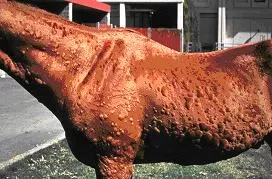
There are, however, some more serious cases where horse may have diarrhea or respiratory distress in combination with the hives. Major’s owner was shocked to find him this way after a day in a new pasture and was unsure of what could have caused this. Urticaria is a result of immune stimulation to a “trigger” that causes a cell called a mast cell to release its contents, which are irritating to surrounding vessels in the skin causing them to leak fluid into the dermis (middle layer of the skin), causing the lump or “wheal.” The biggest challenge that we face as veterinarians is discovering what that trigger might be.
There are many causes that are implicated for example: inhaled allergens such as pollens and molds, medications most commonly penicillin, dietary causes such as certain grains, insect hypersensitivity, or even cold/heat on the skin. There are some cases we are unable to find a cause, and that is called idiopathic urticaria. The problem is that it can be difficult to narrow down any specific changes in a horse’s routine to cause the hives.
In Major’s case, a specific cause of the hives was not able to be determined, but the suspicion was made that the new pasture arrangement was the inciting cause. Most likely, a plant in the new pasture or even an obscure insect sting caused Major’s hives that day. Much to Major’s owner’s relief, a short course of treatment with corticosteroids was effective and he made a full recovery. Treatment of acute hives usually involves the veterinarian administering an intravenous injection of a corticosteroid called dexamethasone, which in a horse who has never had hives, usually takes effect within an hour. We follow up this injection with a dexamethasone powder that you can give you horse in feed for the next 2-4 days. We will try to determine the cause of the hives at this time also, but as described above, this can be very challenging and sometimes only assumptions can be made. Some horses, who have reoccurring hives, can try antihistamines, although these drugs are usually unrewarding in most horses, although, in some it may help to prevent future hives occurrences.

We have not had to treat Major for hives again; he is now happily grazing in his original pasture, without hives! In summary, hives are a challenging and frustrating problem for owners and veterinarians, due to its unpredictability and in some cases persistence. If your horse breaks with hives at any point, it is always important to have a veterinarian examine the horse because there can be other serious causes of swellings on the skin that may resemble urticaria.

